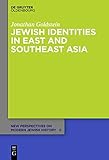Jewish identities in East and Southeast Asia : Singapore, Manila, Taipei, Harbin, Shanghai, Rangoon, and Surabaya / Jonathan Goldstein.
Material type: TextSeries: New perspectives on modern Jewish history ; v. 6.Publisher: Berlin ; Boston : De Gruyter Oldenbourg, [2015]Copyright date: �2015Description: 1 online resource (xi, 242 pages) : illustrations, mapContent type:
TextSeries: New perspectives on modern Jewish history ; v. 6.Publisher: Berlin ; Boston : De Gruyter Oldenbourg, [2015]Copyright date: �2015Description: 1 online resource (xi, 242 pages) : illustrations, mapContent type: - text
- computer
- online resource
- 9783110351507
- 3110351501
- 9783110351514
- 311035151X
- 3110350696
- 9783110350692
- 950.004924 23
- DS135.A85 G65 2015
Includes bibliographical references (pages 206-230) and index.
1. Jewish identities in East and Southeast Asia : common denominators and dissimilarities -- 2. Setting a standard for Jewish identity in East and Southeast Asia : Singapore's Baghdadi community from 1795-2015 -- 3. Between Spain, the United States, Japan, and Israel : Manila's multicultural "Bagel Boys" in historical perspective -- 4. Taipei : an oasis of tranquility for Americans, Europeans, and Israelis -- 5. Between Russia, China, Japan, and Israel : the transnational identity of Harbin's Jews, 1899-2015, with special reference to the Ehud Olmert family -- 6. Shanghai as microcosm and mosaic of Eurasian Jewish identities, 1850-1960 -- 7. Empire, nationalism, and dissolution : Rangoon and Surabaya, 1752-2015 -- 8. Enduring Jewish identities and legacies across the landscape of East and Southeast Asia.
Print version record.
The Jewish communities of East and Southeast Asia display an impressive diversity. Jonathan Goldstein focuses on transnational Jewish identity in seven of this area's largest cities: Singapore, Manila, Taipei, Harbin, Shanghai, Rangoon, and Surabaya. He emphasizes five factors which influenced the formation of Jewish transnational identity in these places: memory, colonialism, regional nationalism, socialism, and Zionism.-- Provided by publisher.
eBooks on EBSCOhost EBSCO eBook Subscription Academic Collection - Worldwide

